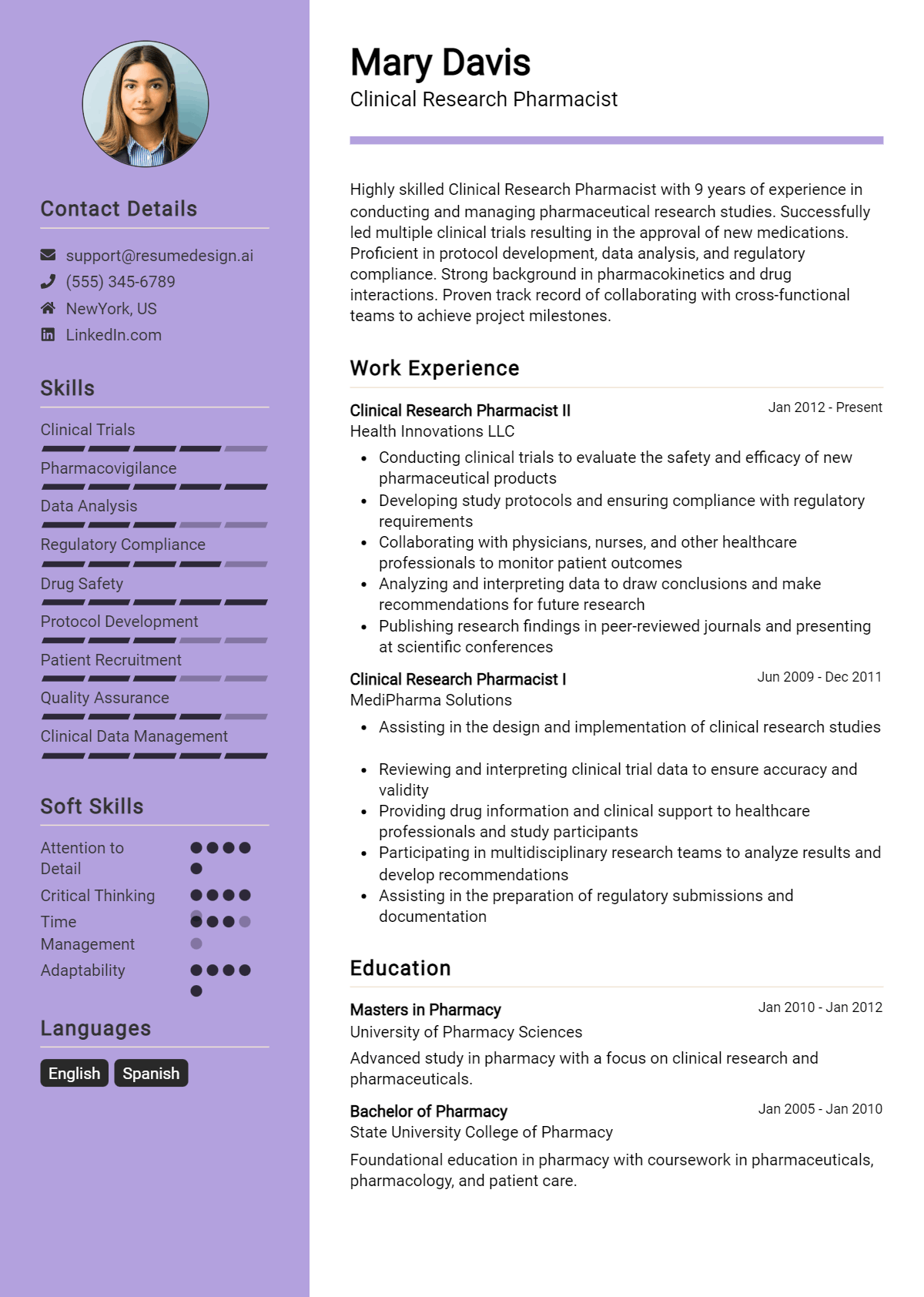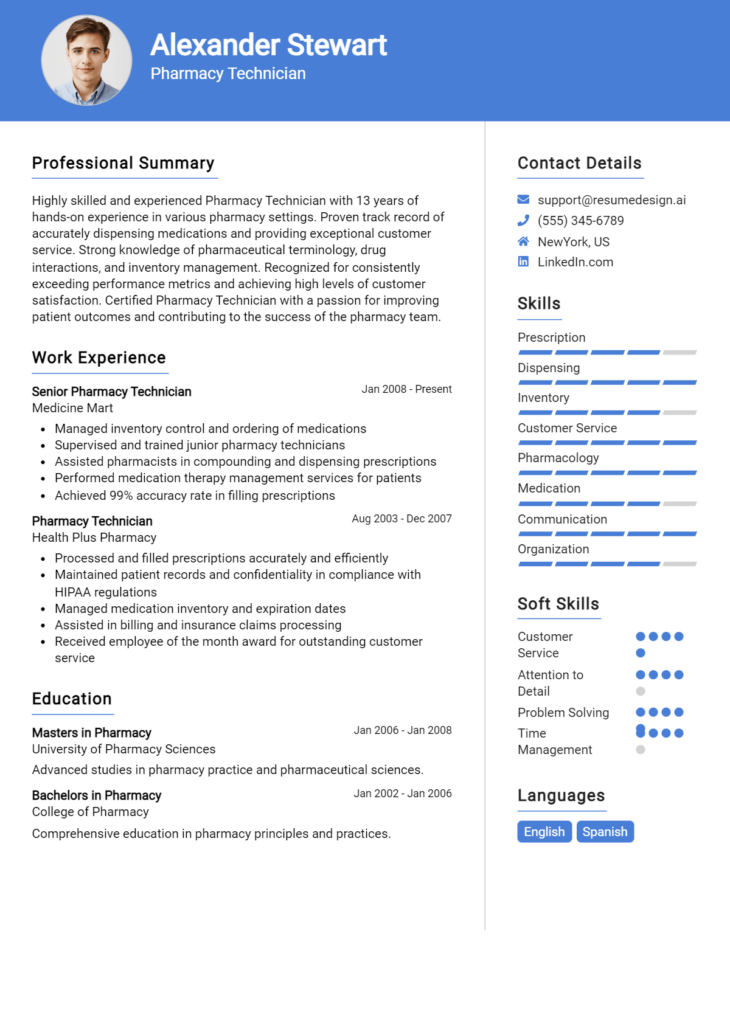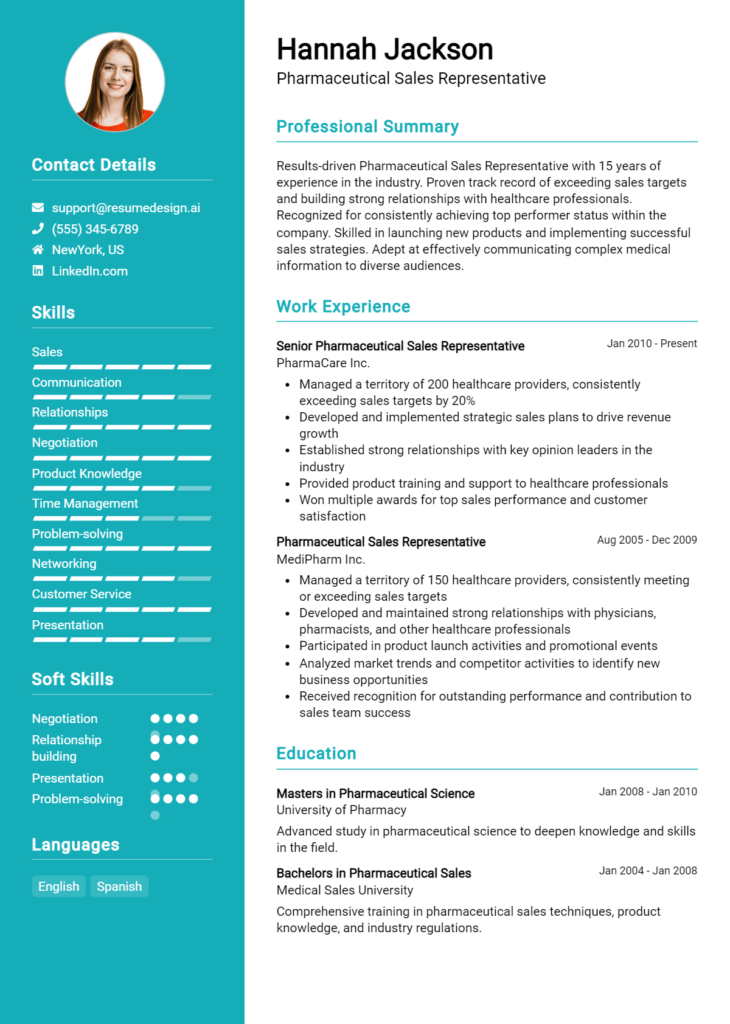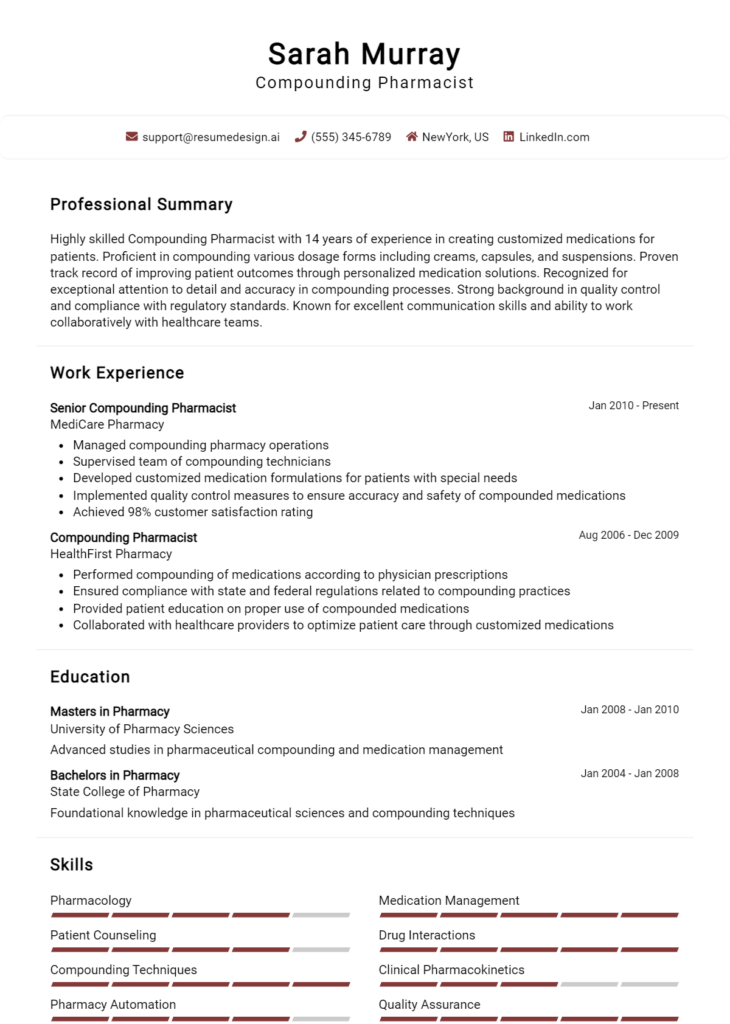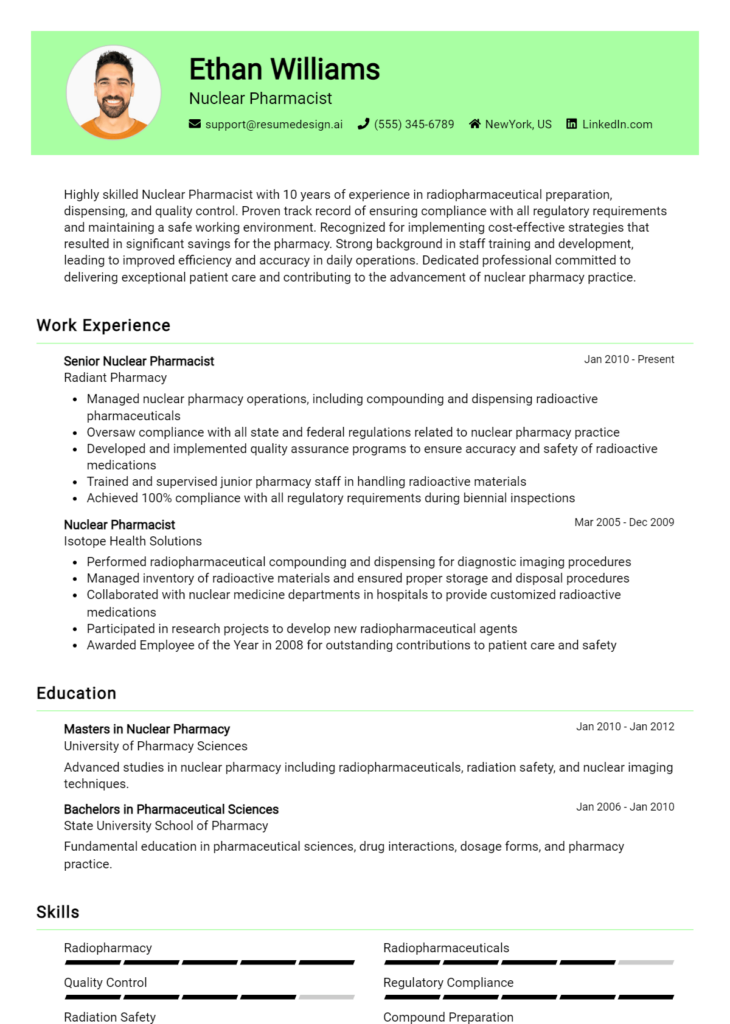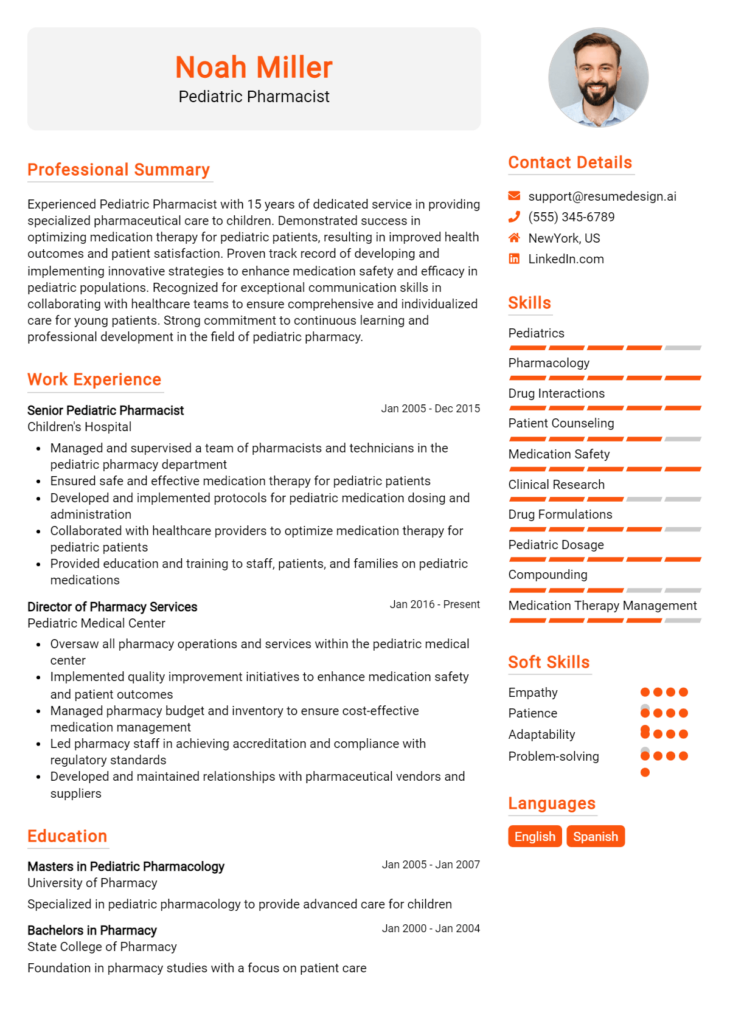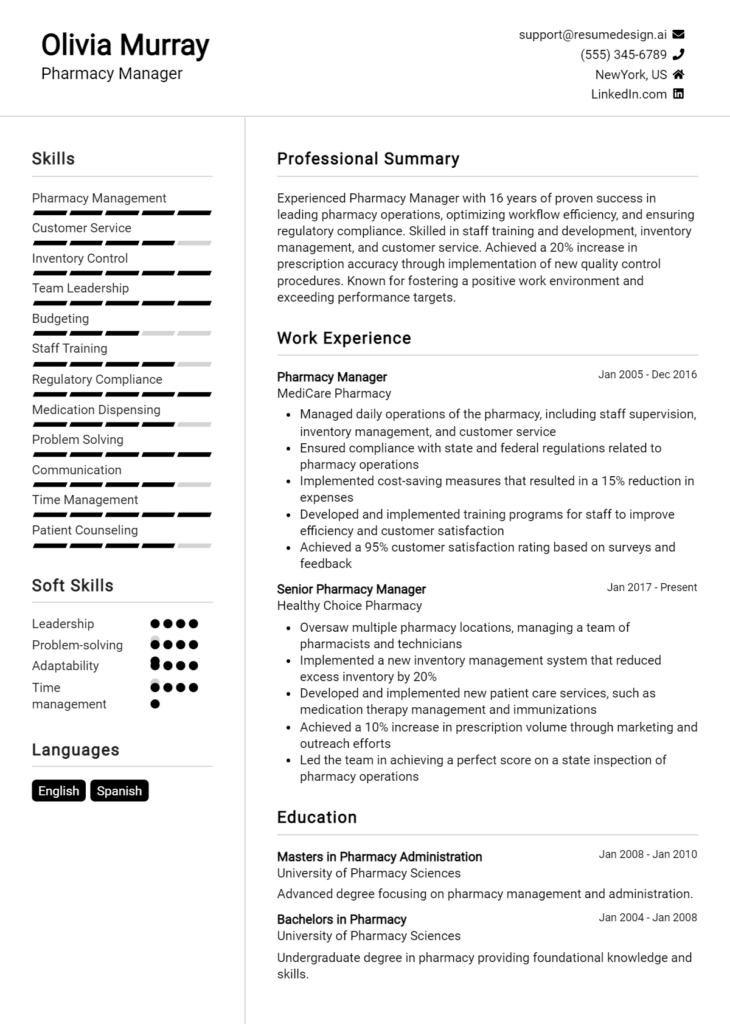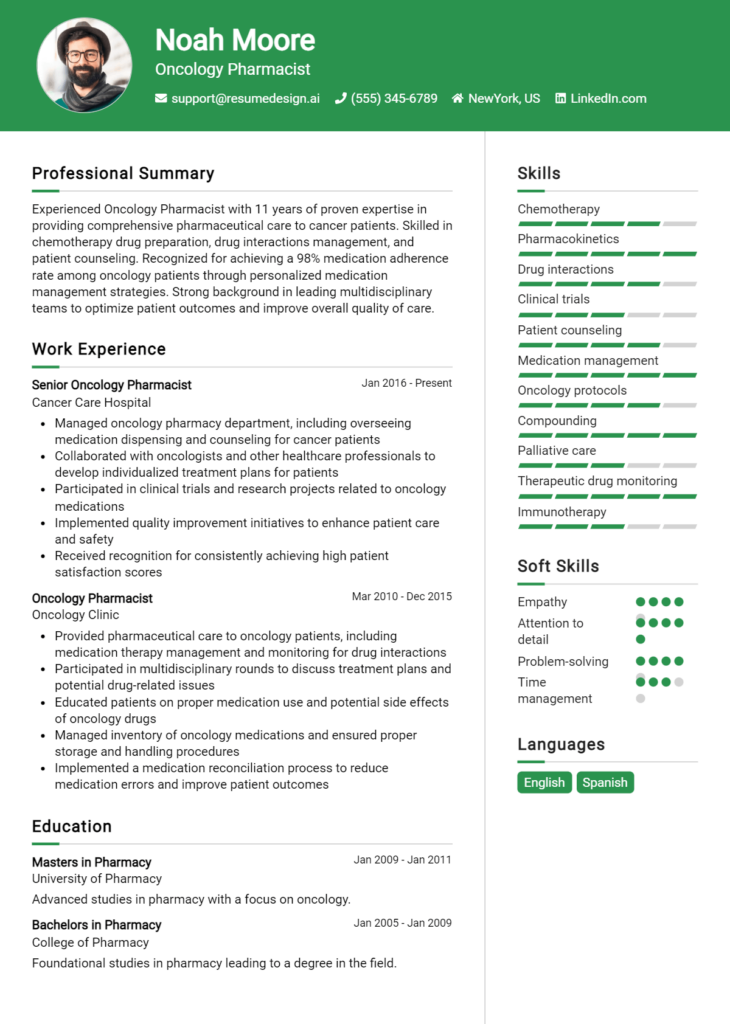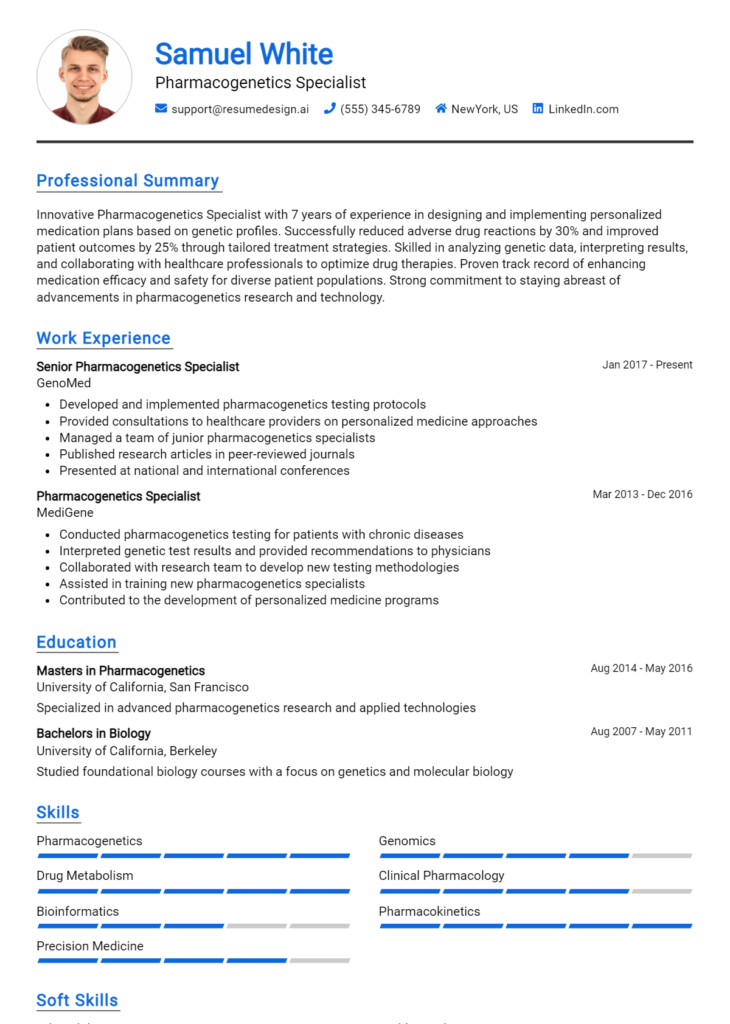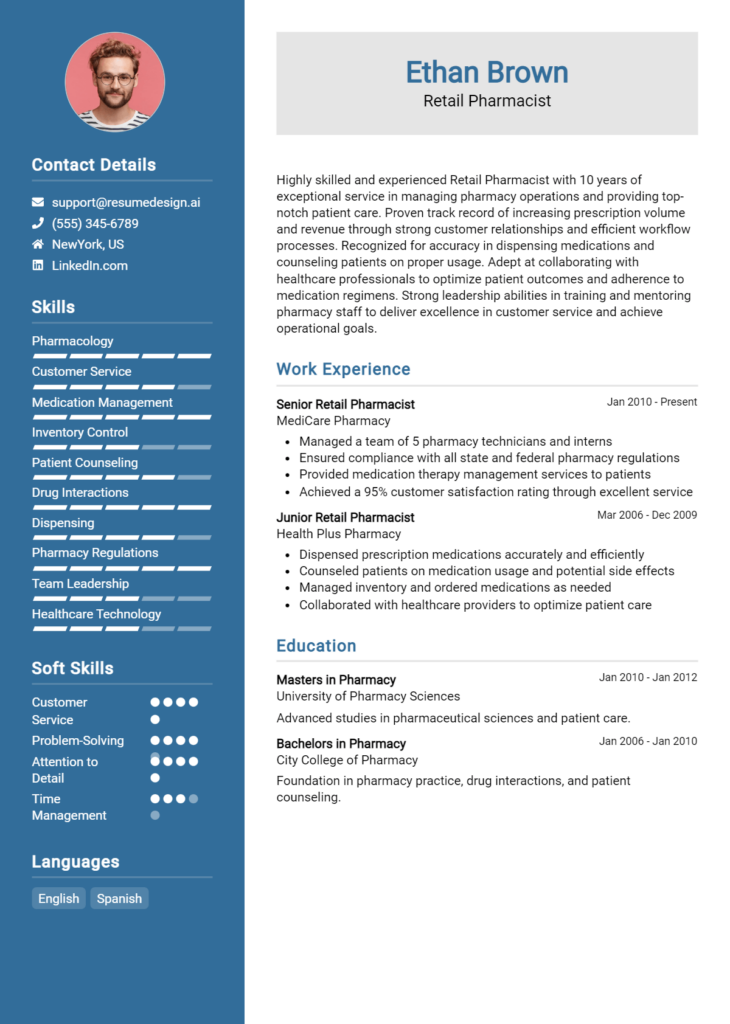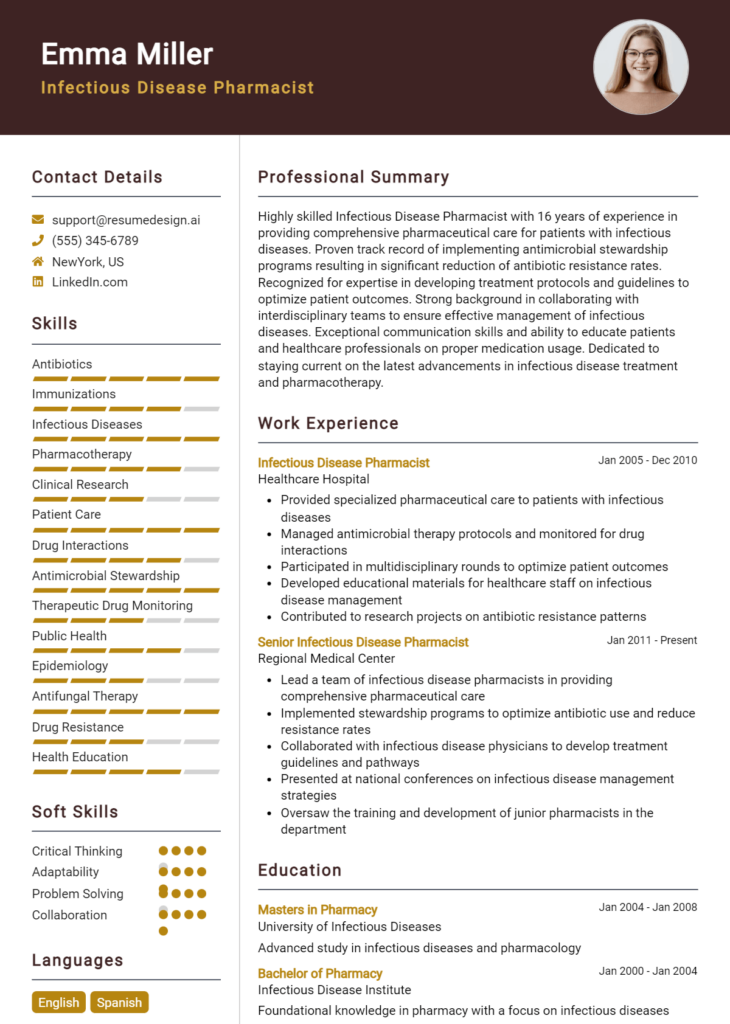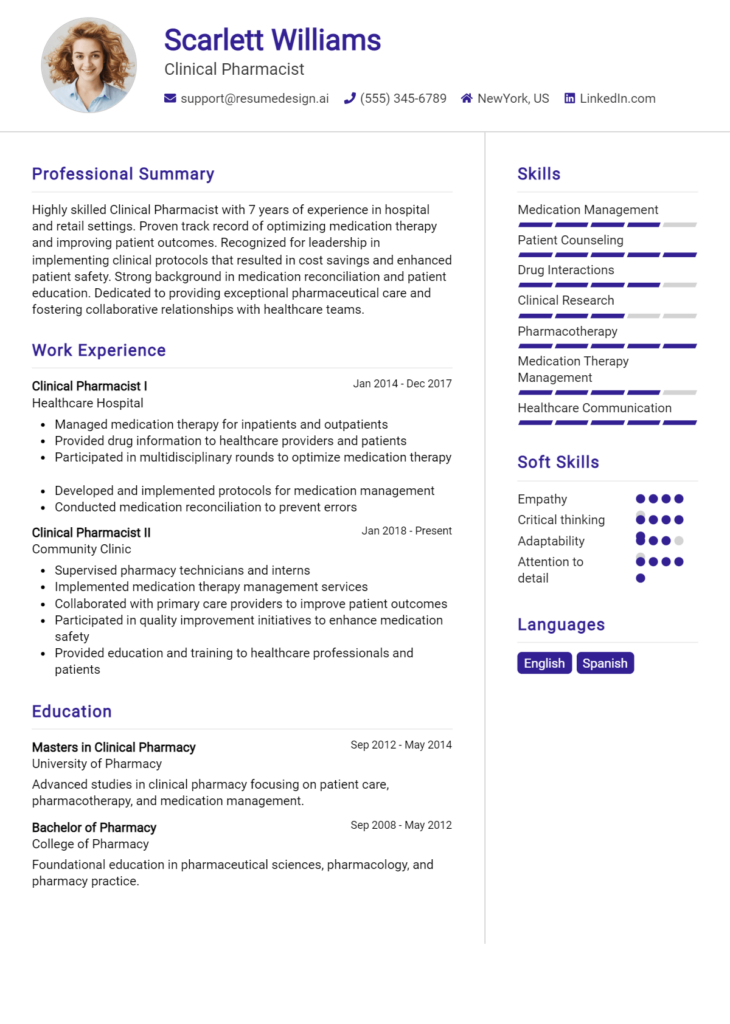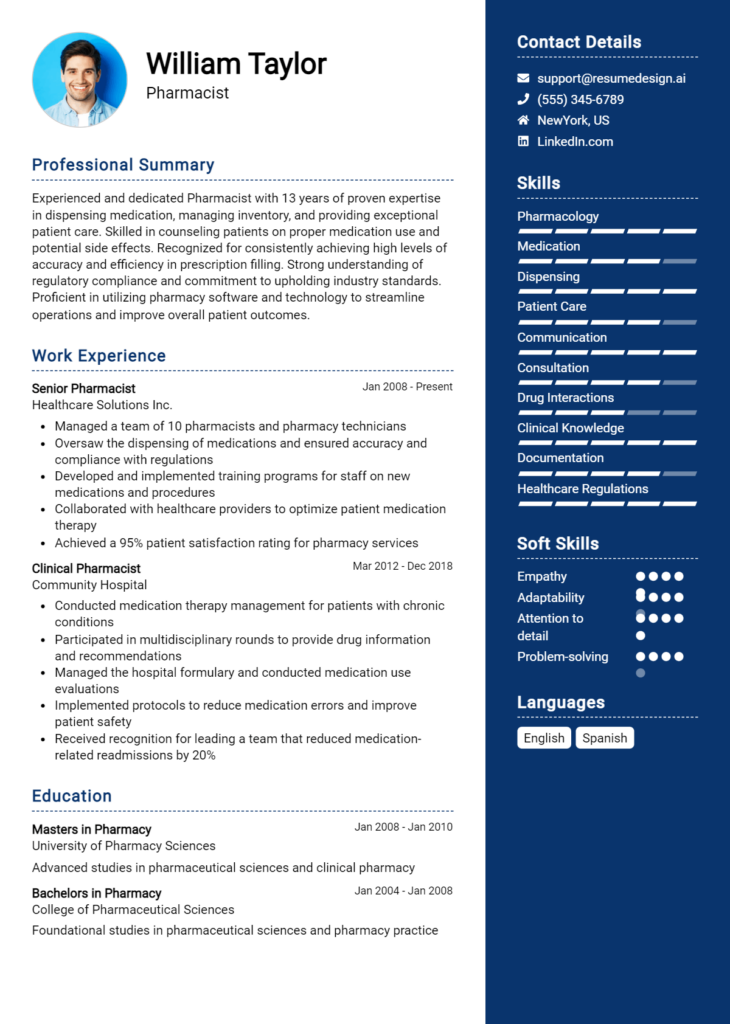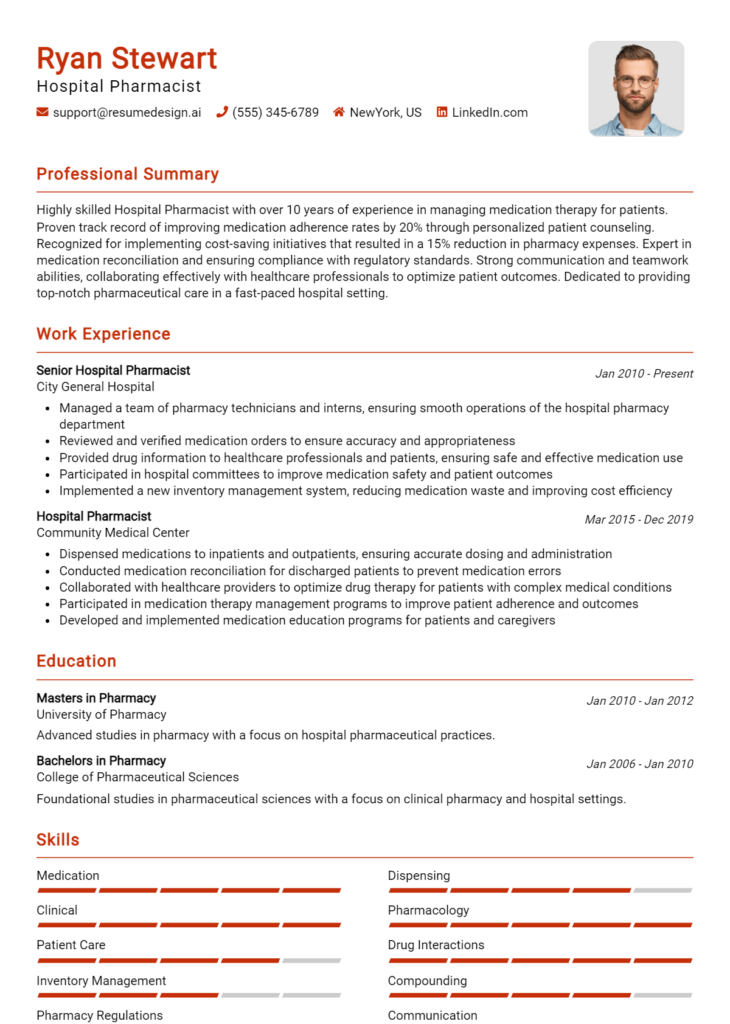Clinical Research Pharmacist Core Responsibilities
A Clinical Research Pharmacist plays a pivotal role in bridging the gap between clinical research and pharmacy departments. Their core responsibilities include designing and implementing drug protocols, ensuring regulatory compliance, and managing medication logistics throughout clinical trials. Essential skills encompass technical knowledge in pharmacology, operational efficiency, and adept problem-solving abilities. These competencies contribute significantly to the organization's goals, maximizing patient safety and trial integrity. A well-structured resume effectively highlights these qualifications, enhancing career prospects in this specialized field.
Common Responsibilities Listed on Clinical Research Pharmacist Resume
- Develop and review study protocols and drug administration procedures.
- Ensure compliance with regulatory requirements and ethical standards.
- Monitor patient medication adherence and safety during clinical trials.
- Coordinate with cross-functional teams, including researchers and regulatory affairs.
- Prepare and maintain documentation related to drug trials.
- Conduct medication reconciliation and adverse event reporting.
- Provide drug information and clinical support to study teams.
- Oversee the procurement and inventory management of investigational drugs.
- Participate in training sessions for study staff on drug protocols.
- Analyze and interpret trial data related to pharmacotherapy.
- Contribute to publications and presentations of clinical research findings.
High-Level Resume Tips for Clinical Research Pharmacist Professionals
In today's competitive job market, a well-crafted resume is crucial for Clinical Research Pharmacist professionals aiming to make a lasting impression on potential employers. Your resume often serves as the first touchpoint between you and your future employer, making it imperative that it effectively reflects your unique skills, achievements, and relevant experience. A thoughtfully designed resume not only showcases your qualifications but also conveys your commitment to the field of clinical research and pharmacy. This guide will provide practical and actionable resume tips specifically tailored for Clinical Research Pharmacist professionals, helping you to stand out in a crowded applicant pool.
Top Resume Tips for Clinical Research Pharmacist Professionals
- Tailor Your Resume: Customize your resume for each job application by aligning your skills and experiences with the specific job description.
- Highlight Relevant Experience: Focus on your clinical research and pharmacy-related roles, emphasizing duties that relate directly to the position you are applying for.
- Quantify Your Achievements: Use numbers and metrics to demonstrate the impact of your work, such as the number of trials managed or the percentage of successful outcomes.
- Showcase Industry-Specific Skills: Include essential skills such as data analysis, regulatory compliance, and pharmacovigilance that are pertinent to clinical research.
- Include Certifications: Highlight relevant certifications, such as Board Certified Pharmacotherapy Specialist (BCPS) or Clinical Research Coordinator (CRC), to showcase your qualifications.
- Utilize Action Verbs: Start bullet points with strong action verbs like "managed," "developed," or "collaborated" to convey a proactive approach.
- Keep It Concise: Aim for a clear and concise format, ideally one page, focusing on the most relevant information to capture the employer's attention quickly.
- Professional Summary: Open with a compelling professional summary that encapsulates your experience, strengths, and career goals in clinical research and pharmacy.
- Proofread for Accuracy: Ensure your resume is free from grammatical errors and typos, as attention to detail is crucial in the clinical research field.
By implementing these tips, you can significantly enhance your chances of landing a job in the Clinical Research Pharmacist field. A polished and targeted resume not only showcases your qualifications but also demonstrates your dedication and professionalism, making you a compelling candidate for potential employers.
Why Resume Headlines & Titles are Important for Clinical Research Pharmacist
In the competitive field of clinical research, a well-crafted resume is crucial for standing out among numerous candidates. The headline or title of a resume plays a pivotal role in this process, as it serves as the first impression for hiring managers. A strong headline can immediately grab attention, encapsulating a candidate's key qualifications and expertise in a single impactful phrase. This concise summary should be relevant and directly aligned with the specific job being applied for, allowing potential employers to quickly assess the candidate's suitability for the role of Clinical Research Pharmacist.
Best Practices for Crafting Resume Headlines for Clinical Research Pharmacist
- Keep it concise: Aim for a headline that is no more than 10-12 words.
- Make it role-specific: Tailor your headline to reflect the job title you are applying for.
- Highlight key skills: Include relevant skills or certifications that set you apart.
- Use impactful language: Choose powerful words that convey your accomplishments and strengths.
- Avoid jargon: Ensure clarity by using language that is easily understood by hiring managers.
- Reflect your experience level: Indicate your years of experience or specific areas of expertise.
- Align with job descriptions: Incorporate keywords from the job listing to enhance relevance.
- Showcase your unique value: Communicate what makes you a standout candidate for the position.
Example Resume Headlines for Clinical Research Pharmacist
Strong Resume Headlines
Experienced Clinical Research Pharmacist with 10+ Years in Oncology Trials
Clinical Research Pharmacist Specializing in Regulatory Compliance and Drug Safety
Pharmaceutical Expert with Proven Track Record in Clinical Study Management
Detail-Oriented Clinical Research Pharmacist with a Focus on Patient-Centric Approaches
Weak Resume Headlines
Pharmacist Looking for Opportunities
Experienced Professional
Clinical Research Worker
The strong headlines are effective because they provide specific information about the candidate's background, skills, and areas of expertise, making it easy for hiring managers to recognize their qualifications at a glance. In contrast, the weak headlines fail to impress because they lack specificity and do not convey any unique value or relevant experience, leaving hiring managers with little to distinguish the candidate from others. A compelling headline can thus be the difference between capturing interest and being overlooked.
Writing an Exceptional Clinical Research Pharmacist Resume Summary
A well-crafted resume summary is essential for a Clinical Research Pharmacist as it serves as the first impression a hiring manager will have of a candidate. This brief overview succinctly highlights key skills, relevant experience, and notable accomplishments in a way that captures attention quickly. A strong summary not only emphasizes the candidate's qualifications but also demonstrates their understanding of the specific needs of the role, making it tailored and impactful. By presenting this information concisely, candidates can effectively set themselves apart in a competitive job market.
Best Practices for Writing a Clinical Research Pharmacist Resume Summary
- Quantify Achievements: Use specific numbers and metrics to demonstrate your impact in previous roles.
- Focus on Skills: Highlight key skills relevant to clinical research and pharmacy practice, such as drug safety, regulatory compliance, and patient care.
- Tailor the Summary: Customize the summary for each job application to reflect the specific requirements and keywords from the job description.
- Be Concise: Aim for 3-5 sentences that deliver a powerful message without unnecessary filler.
- Use Active Language: Employ strong action verbs to convey confidence and proactivity.
- Highlight Relevant Experience: Prioritize experiences that directly relate to clinical research and pharmacy settings.
- Showcase Professional Certifications: Mention any relevant certifications or training that enhance your candidacy.
Example Clinical Research Pharmacist Resume Summaries
Strong Resume Summaries
Dedicated Clinical Research Pharmacist with over 7 years of experience in managing Phase II and III clinical trials. Achieved a 25% reduction in medication errors through the implementation of a new cross-check system, ensuring compliance with regulatory standards.
Results-oriented Clinical Research Pharmacist with expertise in drug safety monitoring and regulatory submissions. Successfully led a team that submitted over 15 Investigational New Drug applications, resulting in a 30% increase in trial approvals within one year.
Experienced Clinical Research Pharmacist skilled in pharmacovigilance and clinical data analysis. Developed a drug interaction database that improved patient safety measures by 40%, supporting multiple clinical study protocols.
Weak Resume Summaries
Clinical Research Pharmacist with experience in various roles. Passionate about helping patients and conducting research.
Pharmacist with some experience in clinical research. Looking to contribute to a team and grow in the field.
The strong resume summaries are effective because they provide specific examples of achievements, quantifiable results, and relevant skills that clearly align with the Clinical Research Pharmacist role. In contrast, the weak summaries lack detail, specificity, and measurable outcomes, rendering them generic and less compelling to hiring managers. By showcasing tangible contributions and expertise, strong summaries make a memorable impact, while weak summaries fail to demonstrate the candidate's qualifications effectively.
Work Experience Section for Clinical Research Pharmacist Resume
The work experience section of a Clinical Research Pharmacist resume is vital as it highlights the candidate's technical skills, ability to manage teams, and commitment to delivering high-quality products. This section not only provides potential employers with a glimpse of the candidate's professional journey but also quantifies achievements that demonstrate expertise in the field. By aligning experience with industry standards and showcasing results, candidates can effectively illustrate their value to prospective employers, making this section crucial for landing an interview.
Best Practices for Clinical Research Pharmacist Work Experience
- Clearly outline your responsibilities and accomplishments in each role.
- Use action verbs to convey a sense of initiative and impact.
- Quantify results wherever possible, such as improvements in study timelines or cost savings.
- Highlight collaborative projects that demonstrate teamwork and leadership skills.
- Align your experience with industry standards, such as Good Clinical Practice (GCP) guidelines.
- Focus on specific therapeutic areas to showcase specialized knowledge.
- Include relevant certifications or training that enhance your qualifications.
- Tailor your work experience to match the job description of the position you are applying for.
Example Work Experiences for Clinical Research Pharmacist
Strong Experiences
- Led a team of pharmacists in a multi-center clinical trial, resulting in a 30% reduction in medication errors and improved patient safety metrics.
- Developed and implemented a new drug inventory management system that decreased costs by 15% and improved order fulfillment timelines by 20%.
- Collaborated with cross-functional teams to design and execute a Phase III clinical trial, successfully meeting recruitment targets ahead of schedule by 25%.
- Authored and presented a comprehensive research paper on pharmacovigilance that was published in a peer-reviewed journal, enhancing the institution's reputation in clinical research.
Weak Experiences
- Worked on clinical trials and assisted with various tasks.
- Participated in team meetings and contributed to discussions on medication management.
- Responsible for inventory checks and ensuring supplies were available.
- Helped with regulatory documentation and compliance efforts.
The examples provided illustrate the differences between strong and weak work experiences. The strong experiences quantify achievements and articulate specific contributions to clinical research efforts, showcasing leadership and technical expertise. In contrast, the weak experiences lack detail and measurable outcomes, making them less impactful and memorable to hiring managers. Clearly defined roles and accomplishments are crucial in demonstrating a candidate's value in the competitive field of clinical research.
Education and Certifications Section for Clinical Research Pharmacist Resume
The education and certifications section of a Clinical Research Pharmacist resume is critical as it showcases the candidate's academic background, relevant certifications, and commitment to continuous learning. This section not only highlights essential qualifications but also demonstrates the pharmacist's preparedness for the complexities of clinical research. By including relevant coursework, industry-recognized certifications, and any specialized training, candidates can significantly enhance their credibility and alignment with the job role, making them more appealing to potential employers.
Best Practices for Clinical Research Pharmacist Education and Certifications
- Prioritize relevant degrees such as a Doctor of Pharmacy (Pharm.D.) or Master’s in Clinical Research.
- Include industry-recognized certifications like Board Certified Pharmacotherapy Specialist (BCPS) or Clinical Research Coordinator (CRC).
- Detail any specialized training in clinical trial management or regulatory affairs.
- Highlight relevant coursework that pertains to clinical pharmacology, biostatistics, or ethics in clinical research.
- Ensure that all credentials are up-to-date and reflect ongoing professional development.
- Use clear and concise language to describe educational accomplishments and certifications.
- List any honors or awards received during your education that relate to the field.
- Consider including professional affiliations or memberships that indicate a commitment to the field.
Example Education and Certifications for Clinical Research Pharmacist
Strong Examples
- Doctor of Pharmacy (Pharm.D.), University of XYZ, 2021
- Board Certified Pharmacotherapy Specialist (BCPS), 2022
- Clinical Research Associate (CRA) Certification, 2023
- Advanced Clinical Pharmacology Coursework, 2020
Weak Examples
- Bachelor of Arts in English Literature, University of ABC, 2015
- Outdated certification in Basic Life Support (BLS), expired 2020
- High School Diploma, 2010
- Certification in Nutrition, not relevant to clinical research
The examples provided are considered strong because they directly align with the qualifications and skills required for a Clinical Research Pharmacist, showcasing a relevant academic background and current certifications that reflect the candidate's expertise. Conversely, the weak examples fail to demonstrate relevance to the role, featuring outdated or unrelated qualifications that do not contribute to the applicant's credibility in the clinical research field.
Top Skills & Keywords for Clinical Research Pharmacist Resume
In the dynamic field of clinical research, a Clinical Research Pharmacist plays a pivotal role in ensuring the safety and efficacy of medications used in clinical trials. A well-crafted resume that highlights the right skills can significantly enhance a candidate's prospects in this competitive job market. Skills not only demonstrate a pharmacist's technical capabilities but also their ability to collaborate effectively with clinical teams, navigate regulatory requirements, and contribute to patient safety. By showcasing both hard and soft skills, candidates can present a comprehensive picture of their qualifications to potential employers.
Top Hard & Soft Skills for Clinical Research Pharmacist
Soft Skills
- Strong communication skills
- Attention to detail
- Problem-solving abilities
- Team collaboration
- Critical thinking
- Adaptability
- Time management
- Leadership qualities
- Empathy and patient care focus
- Ethical judgment
Hard Skills
- Knowledge of pharmacology and therapeutics
- Expertise in clinical trial design
- Proficiency in regulatory compliance (FDA, ICH guidelines)
- Data analysis and statistical interpretation
- Clinical monitoring and reporting
- Familiarity with electronic health records (EHR)
- Medication management systems
- Clinical research methodologies
- Understanding of Good Clinical Practice (GCP)
- Experience with pharmacovigilance and safety reporting
For a deeper understanding of how to effectively showcase these skills and highlight relevant work experience, candidates should consider tailoring their resumes to reflect their unique qualifications and contributions to clinical research.
Stand Out with a Winning Clinical Research Pharmacist Cover Letter
Dear [Hiring Manager's Name],
I am writing to express my interest in the Clinical Research Pharmacist position at [Company Name], as advertised on [where you found the job posting]. With a Doctor of Pharmacy degree and over [X years] of experience in clinical research and pharmaceutical care, I am excited about the opportunity to contribute to your team. My background in clinical trial management, coupled with my passion for advancing patient care through research, makes me a strong candidate for this role.
Throughout my career, I have successfully collaborated with multidisciplinary teams to design and implement clinical trials that optimize medication use and enhance patient outcomes. My experience includes conducting literature reviews, developing study protocols, and ensuring compliance with regulatory standards. At [Previous Employer], I played a pivotal role in a Phase II clinical trial, where I was responsible for managing drug accountability, educating staff on protocol requirements, and monitoring adverse events. My ability to communicate effectively with physicians, nurses, and study participants has been instrumental in fostering a positive research environment.
I am particularly drawn to [Company Name] because of its commitment to innovation and excellence in clinical research. I admire your focus on [specific projects, values, or goals of the company], and I am eager to bring my expertise in pharmacology and clinical research methodologies to support your initiatives. I am confident that my analytical skills and attention to detail will contribute to the success of your clinical trials and further the mission of improving patient care through evidence-based research.
Thank you for considering my application. I look forward to the opportunity to discuss how my experience and passion for clinical research align with the goals of [Company Name]. I am excited about the possibility of joining your team and contributing to groundbreaking research that enhances patient outcomes.
Sincerely,
[Your Name]
[Your Contact Information]
Common Mistakes to Avoid in a Clinical Research Pharmacist Resume
When crafting a resume for a Clinical Research Pharmacist position, it's crucial to present your qualifications and experience effectively. However, many candidates make common mistakes that can hinder their chances of landing an interview. By being aware of these pitfalls, you can create a polished and professional resume that stands out to hiring managers. Below are some frequent errors to avoid:
Using Generic Templates: Relying on one-size-fits-all templates can lead to a lack of personalization. Tailor your resume to highlight your unique skills and experiences relevant to clinical research.
Neglecting Keywords: Failing to incorporate industry-specific keywords can make your resume less visible in applicant tracking systems. Study the job description and include pertinent terms that reflect your expertise in clinical trials and pharmacology.
Overloading with Jargon: While it's important to showcase your technical knowledge, using excessive jargon can confuse readers. Aim for clarity and conciseness to ensure your resume is accessible to both HR personnel and clinical professionals.
Listing Duties Instead of Achievements: Simply listing job duties without demonstrating your impact can make your resume less compelling. Focus on quantifiable accomplishments, such as reducing medication errors or improving trial adherence rates.
Ignoring Formatting Consistency: A cluttered or inconsistent format can distract from your qualifications. Use uniform fonts, bullet points, and spacing to create an organized and easy-to-read layout.
Omitting Relevant Certifications: Failing to include essential certifications, such as board certification in pharmacotherapy or clinical research certification, can diminish your credibility. Ensure these are prominently displayed.
Excessive Length: A lengthy resume can discourage hiring managers from reading through your qualifications. Aim for a concise, focused document, ideally one to two pages, that highlights your most relevant experiences.
Neglecting Soft Skills: While technical skills are vital, overlooking soft skills such as communication, teamwork, and problem-solving can be a mistake. Highlight these attributes to show your ability to collaborate in a clinical setting effectively.

